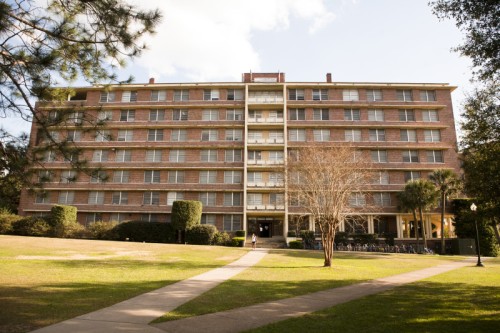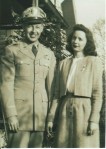For Father’s Day, June 2010
Places of Enchantment: A Tribute to Alton Bernard “Nobby” Blair
Born October 29, 1919 and Died February 21, 2006

A few months after my mother died, my father moved to Tallahassee and, for almost five months, he lived only one mile from our Payne home. At first, I wondered how he and I would find “common ground” during our daily visits, for Dad was a “doer” and I was a “dreamer.” He had been an athlete, a coach, an educator, and a military officer. A handyman who could fix anything, he was a wood craftsman and built furniture and clocks for his family. He even designed and built the interior of his retirement mountain home. I, on the other hand, was often lost in the world of “arts and ideas.”
One autumn evening, I introduced Dad to the film, Cross Creek, based on the memoirs of Marjorie Kinnan Rawlings and her 25 years of community life in rural central Florida. The film was enchanting: it was beautiful, quiet, thoughtful, and lyrical. At breakfast the next morning, he said, “I am still thinking about that film.” He had never been a reader of literature, so I was amazed when he devoted two hours, every night, to reading the book, Cross Creek. It had captured his imagination, as it had always captured mine.
During those fall evenings, chapter-by-chapter, he and I enthused about Cross Creek: We shared our favorite passages; critiqued the writing style; discussed the characters, the land and water, the woods and wildlife, the flora and fauna, the food and folkways. After finishing the book, he ruefully told me that, to him, all other reading had become dull. I quickly asked my sisters, Susan and Amy, to order other Rawlings book titles for Dad. In astonishment, they asked each other, “Which Dad would that be?”
I was delighted, yet puzzled, by this new-found connection that Dad and I shared, until I pondered this quote by Rawlings:
“I do not understand how anyone can live without some small place of enchantment to turn to.”
I then asked myself, “Who was it that first introduced you to places of enchantment?” . . . . .
. . . . . In the summers of the 1960’s, our West Coast Blair Family Retreat was to the campgrounds of Big Sur, California: Together, we chose the best rustic campsite by the creek, set up the tent; read, napped, and gazed up at the sunlight, peeking through the majestic sequoias and redwoods; hiked up to the water falls and crossed moss-covered footbridges; fell asleep to the soothing sound of the bubbling creek; and woke up to the call of the song birds, in the morning.
As my younger brother, Michael, said, “Well, here we all are – out in the natures!”
In my memories of Big Sur, the moonlight shone on huge stepping-stones, as our family crossed the shallow creek, to gather with the other families, at the outdoor amphitheatre. We huddled around the campfire, sipped hot cocoa, and waited for the park ranger to greet us: “Howdy, Campers!” He led us in rousing renditions of campfire songs; we sang with unabashed enthusiasm and learned all the hand-motions, too.
Even forty years later, my father still loved to sing those campfire songs with his family. We sang them, every summer, at our East Coast Blair Family Retreat: the North Carolina mountain home of my parents. Dad and Susan created identical “Campfire Songbooks” for each member of the growing Blair Clan. Ten years ago, in Blowing Rock, North Carolina, Michael led family and friends in singing campfire songs, after the celebration dinner that commemorated the 50th wedding anniversary of my parents.
We discovered that we could take those songs anywhere: They were our connection to each other, to places of enchantment, and to all that was true, good, and pure about nature and family life. . . . .
. . . . . Back in Tallahassee, sitting with Dad, the daylight hours were shortening, as the autumn of 2005 faded into winter. The Rawlings books arrived, which my sisters had ordered. However, by then, Dad was too weak to read them, so, during the evenings, at his bedside, I read extracts to him. With delight, I told him of this discovery: “Mizz Rawlin’s” spent one fall season, in 1936, living and writing in a retreat cabin, in Banner Elk, NC. I could imagine her, gazing out her cabin window, drawing inspiration from the same magnificent, panoramic view that would captivate my father, some 40 years later. Dad would then introduce his family to this enchanted place and it would become our Blair Clan Reunion Retreat for the next 25 summers.
In the final weeks of his life, my father often reviewed his life in “daydreams.” These were vivid, strong, and persistent memories; they represented events that had been very important to him.
One day, I asked him, “What are you day-dreaming about?”
He answered, “Big Sur.” He spoke only in a whisper and his eyes were closed but he could smile and nod.
I told him, “I remember waking to the good aroma of your campfire coffee and breakfast in the mornings.” He smiled.
I asked him, “Do you remember the morning when a blue jay zoomed down and snatched a hot blueberry pancake off a plate on the picnic table?” He nodded.
I continued: “Do you remember what you said, as you scratched your head and watched the little thief fly away?” He waited.
I reminded him, “You said, ‘That was either a very light pancake or a very strong bird!’”
He smiled and the corners of his eyes wrinkled with delight, in the remembering. He went back to sleep.
It was only Valentine’s Day but an early spring had arrived in Tallahassee: The, azalea, dogwood, and redbud were blooming. I was overjoyed when my father lived long enough to see a Carolina chickadee return, at last, to the window bird feeder. Dad did not live long enough to return, one last time, to the mountains of North Carolina. One week later, he was gone from the land and water he loved so well. However, before his passing, he had imparted to his children and grandchildren a desire to turn — and return — to places of enchantment. This legacy will be his strong connection to many generations.
Margot Blair Payne, Daughter, The First Week of Lent 2006, Tallahassee, FL
“ . . . If there be such a thing as [collective or instinctual] memory, the consciousness of land and water must lie deeper in the core of us than any knowledge of our fellow beings. We were bred of earth before we were born of our mothers. Once born, we can live without mother or father, or any other kin, or any friend, or any human love. We cannot live without the earth or apart from it, and something is shriveled in a man’s heart when he turns away from it and concerns himself only with the affairs of men.”
“ . . . It seems to me that the earth may be borrowed but not bought. It may be used but not owned. It gives itself in response to love and tending, offers its seasonal flowering and fruiting. But we are tenants and not possessors, lovers and not masters. Cross Creek belongs to the wind and the rain, to the sun, and the seasons, to the cosmic secrecy of seed, and beyond all, to time.”
~~~All quotes are from Cross Creek, the memoirs of Marjorie Kinnan Rawlings, 1942, Scribner’s
Epilogue: August 14, 2006
One week after the Memorial Service for my father, my husband, Stephen, and I returned to The Hiding Place Columbarium, a walled garden on the property of the Banner Elk Presbyterian Church. My parents chose this garden as their final resting place: Their cremains, each contained within an urn, are interred within two niches, side-by-side. Brass plaques identify their names, dates of birth, and dates of death.
From the vantage point of the garden, Stephen and I turned around in a circle and surveyed the sweeping vista of the mountains: The view beyond the Columbarium Garden Archway faced the majestic Grandfather Mountain. The opposite view led to Beech Mountain, where my parents built their retirement home. To the left of the archway, a short distance up the hill from the Columbarium Garden, stood the sturdy, stone church, over 150 years old, the denomination of my Scottish ancestors. Yet another direction revealed the road leading to The Grandfather Home for Children. My parents had been enthusiastic supporters and promoters of this home, which gives hope, health, and healing to children from troubled homes.
By vehicle, we followed the road to the Grandfather Home for Children. On foot, we explored the property and found a bench and a commemorative marker, which the Marjorie Kinnan Rawlings Society had placed:
Marjorie Kinnan Rawlings ~ 1896-1953
Rawlings wrote the first draft of her Pulitzer-winning novel, The Yearling, in this location. Her famous short story, A Mother in Mannville, featured a boy at Grandfather Home. Both stories are popular MGM movies.
~~~~~~~~~~
[For more information: Marjorie Rawlings In the Mountains: The Story Behind A Mother in Mannville, Mary Dudley Gilmer, 2004.]





